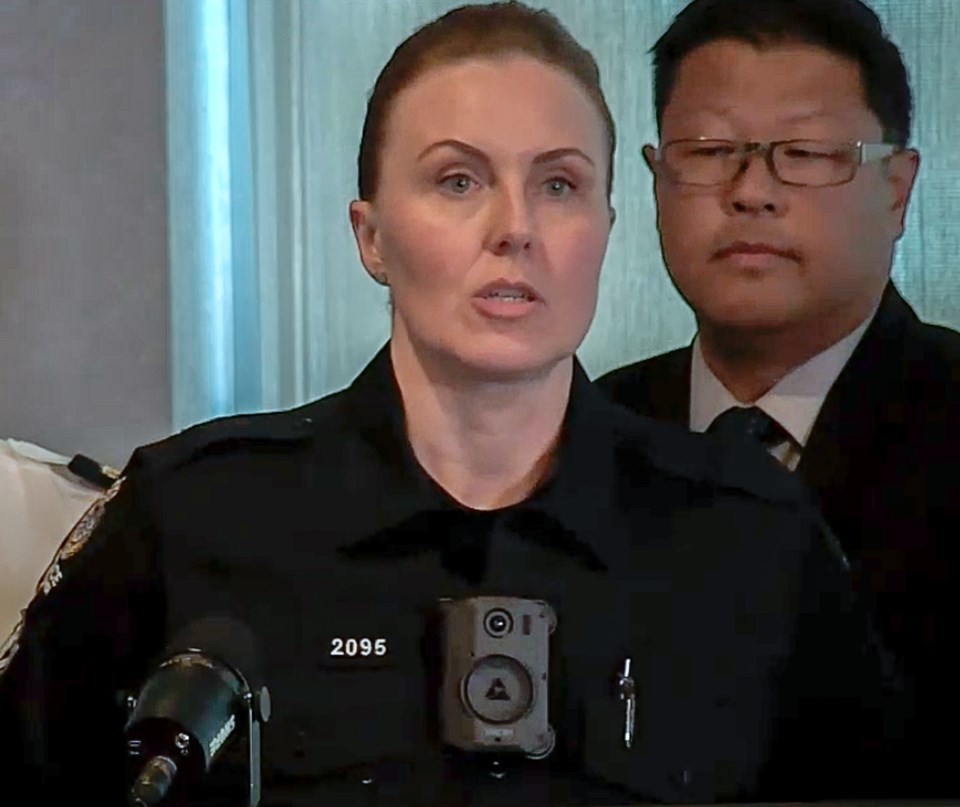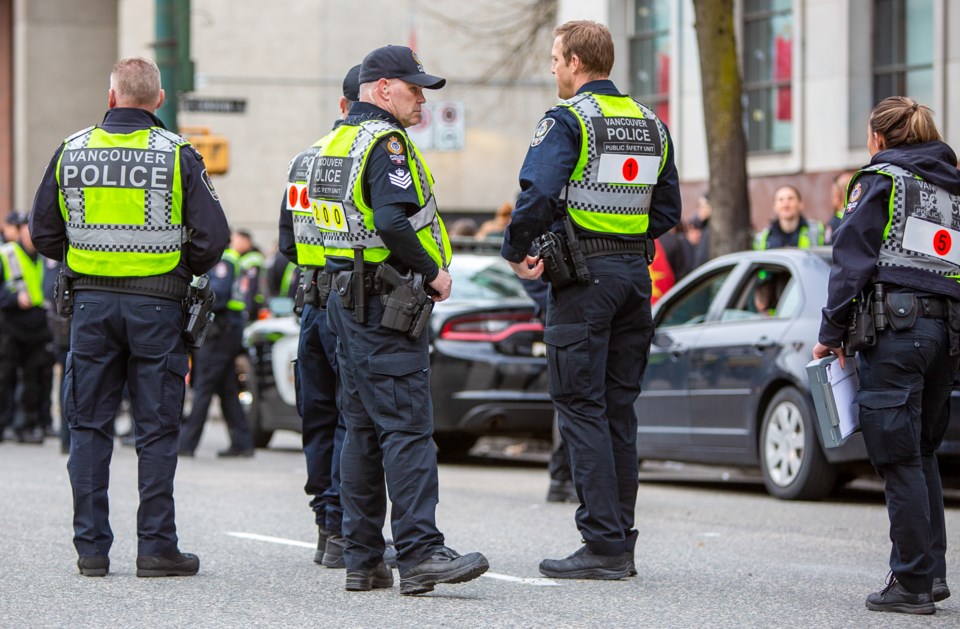Vancouver police officers working in the part of the city that includes the West End, downtown business district and Downtown Eastside will begin wearing body cameras this fall.
Police haven’t released an exact date for deployment of the cameras but say the six-month experiment will only include officers who volunteer to wear the portable video devices.
A report that went before the Vancouver Police Board Sept. 21 estimated 80 to 100 officers working in the two policing districts that run from Stanley Park to the Pacific National Exhibition grounds will participate.
Motorcycle officers from the traffic section will also be outfitted with cameras on their helmets, according to the report, which was accompanied by a presentation from officers, including Staff Sgt. Andrea Anderson, who was wearing a camera at the time.
Supt. Howard Tran told the board that “if all goes well, full implementation can occur in 2025.”

Evaluation report
That implementation will depend on feedback from officers, the public and the board.
An evaluation report of the trial is expected to go before the board sometime in the last quarter of 2024, according to Victor Quan, the VPD’s staff project coordinator for the program.
“We will also measure the use of force by officers and the use of force directed to officers who are wearing the body worn cameras,” Quan said. “We will also measure the number of complaints against officers wearing these body worn cameras.”
As part of the program, the VPD will create a new tab on its website where citizens can view guidelines governing the use of the cameras. A frequently-asked-questions section will also be posted on the website.
In addition, a public email address will be set up to receive questions and feedback. Short video clips will be created and posted on the VPD’s social media platforms to answer questions and concerns.
Council cannot mandate cameras
City council will also receive an evaluation report on the cameras, although council cannot mandate officers to wear cameras. That is the jurisdiction of the police board.
The ABC Vancouver majority, however, was clear in its campaign that it wants officers to wear cameras. The ABC Vancouver members also ensured at least $200,000 was available via the VPD’s budget to operate the six-month camera experiment.
It isn’t clear whether those costs have increased or how much the VPD paid for the Axon body cameras. Over the years, the department has consistently said setting up a full program would be difficult because of costs.
The B.C. government now has standards for how police officers should use body cameras, but they don’t mandate their use. Delta Police Department has outfitted some of its officers with cameras.
The Delta force currently has 16 cameras, according to information posted on the department’s website, which said total cost of the purchase of the cameras and associated equipment was $18,000.
Approximately half of the cost was funded by a “police training and equipment grant” from the provincial civil forfeiture office.
Myles Gray
Earlier this year, a coroner’s jury into the death of Myles Gray, who died after an altercation with Vancouver officers in August 2015, recommended patrol officers begin to wear audio recording-capable cameras.
Police Chief Adam Palmer told the board Sept. 21 that the recommendation didn’t prompt the VPD to consider cameras.
“This is actually something that VPD called for in 2021, it's something that the board and city council approved in 2022,” he said.
“The Myles Gray recommendations were only from about four months ago. They're long after the fact, and they do form a part of that but really, the nexus and all the work on this was done well before that inquest.”
Palmer is on record telling B.C.’s Special Committee on Reforming the Police Act that he supports the deployment of cameras as a tool to strengthen public trust and confidence in police.
'Another set of facts'
As far back as 2013, a Vancouver police report that went before the police board pointed to several benefits of having police wear cameras, including increased transparency.
“When an incident occurs and the facts of the case are disputed by police officers and suspects, the camera provides another set of facts which may aid in determining what actually occurred,” the report said.
“However, it is important to note that the value of [body cameras] in many use-of-force situations is limited due to the fact that in the case of a struggle, the video will likely be obscured.”
In 2016, the Independent Investigations Office said in its annual report that it could have better resolved a significant number of cases in B.C., if officers were equipped with body cameras.
The report concluded that footage from cameras would have potentially assisted in 93 per cent of 71 investigations reviewed by the agency’s investigators.
Of the 71 cases reviewed, 49 involved general duty officers, 17 were related to dog handler teams and five concerned emergency response teams and the Combined Forces Special Enforcement Unit.




